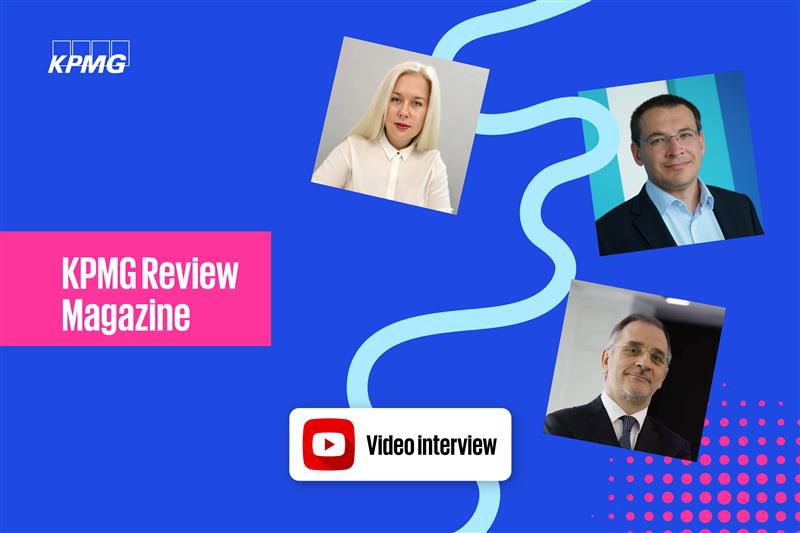As Ukraine moves from resilience to recovery, strategic partnerships are becoming critical drivers of long-term reconstruction. Ahead of the Ukraine Recovery Conference 2025 in Rome, KPMG Review Magazine sits down with Mario Corti, Senior Partner at KPMG Italy, and Andriy Tsymbal, Managing Partner at KPMG in Ukraine, to explore how professional collaboration is evolving in response to one of Europe’s greatest geopolitical and economic challenges.
This conversation comes just before KPMG’s official side event, “The Role of Human Capital in Reconstruction”, which will be held on July 9 at Rome’s historic Rondinini Palace. Organized under the patronage of Italy’s Ministry of Foreign Affairs and International Cooperation, the event will bring together business leaders, policymakers, and institutional stakeholders to focus on one of the most pressing issues in Ukraine’s recovery: investing in people.
In a conversation with Viktoriia Mykhno, Director of business development and marketing department at KPMG in Ukraine, Mario Corti and Andriy Tsymbal discuss how KPMG can help companies navigate complexity, connect with trusted partners, and act early — turning uncertainty into opportunity at a pivotal moment for Ukraine and Europe.
— Mario, how has the collaboration between KPMG Italy and Ukraine offices evolved in the face of today's complex geopolitical reality? What key lessons have you learned from this challenging period, and how has this partnership transcended mutual support between countries?


Mario Corti: —Actually, from the outset, KPMG Italy has been engaged in supporting Ukraine, and probably the support is twofold. The first one is, of course, the humanitarian response, with direct support through our KPMG Italy Foundation. And we also tried to mobilize our people for a fundraising process — this since the outset of the war. Second — and also very important — is the exchange of expertise, of skills, of professionals. And we welcomed in Italy some professionals from Ukraine, giving real meaning to solidarity and offering concrete support for allowing these professionals to continue in their professional activity.
I think both actions were very positive from our side, and they were able to reinforce and strengthen the relationship we have within the network, and particularly between KPMG in Italy and KPMG in Ukraine.


—Andriy, what key lessons have you learned from this challenging period, and how has this partnership strengthened mutual support between countries?
Andriy Tsymbal: — Well, from Ukraine’s perspective, we are aiming to use the vast experience and capabilities of our colleagues at KPMG in Italy in order to help Ukrainian and Italian companies to support the rebuilding and development of Ukraine — by also engaging with various donor organizations, international financial institutions, private sector companies, the Ukrainian government, and the European Union.
And we are now scaling this commitment together with our Italian colleagues. We are shaping joint initiatives ahead of the Ukraine Recovery Conference, which is taking place in Rome in July of this year. And the goal is clear — to mobilize the private sector to help rebuild and modernize the Ukrainian economy. And here is what we’ve learned: partnerships under pressure accelerate trust, force focus, and drive real outcomes. And when that happens, business growth isn’t just a separate goal — instead, it comes along as we are doing the right thing, with the right people, and at the right time.
— My next question, Mario, would be specifically about the Ukraine Recovery Conference, which Andriy just mentioned. Why is it important for you to participate in this year’s Ukraine Recovery Conference in Rome? What key topics do you plan to discuss, and what will be KPMG Italy’s level of engagement? What opportunities does this event open up for the future in terms of business?


Mario Corti: — Actually, you’re right — the Ukraine Recovery Conference in Rome is a key event that is planned in July. And I think it’s a key opportunity for KPMG to actively take part in the reconstruction of the country that is — as we know, as you know better than me — but as we all know, facing extraordinary challenges. And KPMG, as a leader in professional services, is committed to fostering a recovery path that is resilient, inclusive, and effective.
One of the core objectives of the conference is, as you said, mobilizing businesses, financial resources, and technical expertise. To put all these pieces together is, I think, essential for rebuilding certain critical sectors for Ukrainian society — such as infrastructure, welfare, healthcare — just to mention some examples. And I believe KPMG Italy can make a significant contribution, a significant role in this effort — by mobilizing resources and expertise, and by putting together public resources and private players in this very critical process.
So, our goal is to strengthen the collaboration among institutions on one side, and businesses on the other side. It’s important that these two players talk — and talk in a structured way. It’s not only a matter of financial resources — it’s also a matter of expertise in order to guide and steer the right process for the reconstruction of the country.
As a side event during the conference, together with KPMG in Ukraine, KPMG Italy will also organize a side event dedicated to human capital — because we believe that human capital is key in the process. Human capital means expertise, means reskilling the people, facing the technological challenge. This will be key for responding to the requests that are coming from different sectors of society — and I name health, welfare, reskilling, labor policy, and green transition, just to name a few of these opportunities.
But again, on each one of them, investment in human capital is key. And also in this respect, I think KPMG Italy can provide good support.
— Absolutely, human capital is one of those key topics which is crucial for the recovery itself. Andriy, what additional key topics do you plan to discuss in this year's Ukraine Recovery Conference? What opportunities does this event open up for the future, from your point of view?


Andriy Tsymbal: — I think the broader focus of the conference — and this is what Mario already said — is to mobilize resources. And I think the most important thing is to mobilize private capital, private companies — let’s say, by creating a risk-sharing mechanism, enabling public-private partnerships, and sharing real business cases from Ukrainian companies that have adapted, I would say, to the extraordinary current circumstances and demonstrated incredible resilience while operating under current conditions.
We really aim to play an active role in facilitating those discussions — let’s say in energy and other sectors mentioned by Mario — by bringing together a concentrated group of leaders, investors, financial institutions, policymakers, and entrepreneurs. We aim to have truly working sessions designed to drive alignment and execution.
For businesses — and I think especially for Ukrainian businesses — this is a chance to lead, not to follow, and to be part of the most important, high-stakes recovery of our time. Also, I think for countries, it's an opportunity to convert diplomacy into long-term economic strategy. And for Ukraine, it’s a step closer to integration with our Italian and European partners. We’re all in it.
— Mario, what is the main goal of the KPMG Ukraine Gateway Initiative, and how can this project help Italian companies successfully enter the Ukrainian market? What role can KPMG play in this context, and what long-term advantages does this initiative offer for investors?
Mario Corti: — Actually, the Ukraine Gateway Initiative is a project launched with the clear objective to foster and improve collaboration among international organizations, governments, and businesses — to unlock investment opportunities and promote sustainable development in Ukraine.
At KPMG Italy, we embraced this vision, and I think it's a good example of a project that can also help Italian companies navigate the complexity of entering the Ukrainian market and offer strategic guidance to those companies looking to do so.
In this context, KPMG Italy, like other KPMG firms in the network, is activating the Business Navigator model — a tool and approach already developed by other KPMG firms. As a pioneering initiative, it helps Italian companies access the market. This Business Navigator will offer tailored advisory services and practical tools to address regulatory, operational, and strategic complexity.
I think it will be important for Italian companies and investors, and they might achieve two goals. First, positioning early in the market — because we are at the start, hopefully, of this process, and being early is clearly an advantage. Second, aligning with major international aid and financing mechanisms — which, of course, will be part of this complex process that the country is undertaking.
— Andriy, how can the KPMG Ukraine Gateway Initiative help Ukraine’s recovery overall? What long-term advantages does it offer for investors?
Andriy Tsymbal: — As Mario said, the goal of the KPMG Gateway Mission is quite simple. It’s really to connect the full strength of our global KPMG network and utilize the experience it has — in order to help rebuild Ukraine and to help international and Italian companies enter the market with confidence and clarity.
But I’d also like to highlight the importance of this initiative in helping Ukrainian businesses find foreign partners — including Italian companies. Because what we’re seeing currently in the market is that there are a lot of entrepreneurs, a lot of initiatives — but what Ukrainian businesses really need is expertise, know-how, and the capital that comes from an international perspective, particularly from the Italian side.
So really, what we’re doing at KPMG — and yes, this initiative is focused on that — is bringing together the needs of Ukrainian development and Ukrainian companies on the ground with the vast expertise and resources from abroad, including from Italian companies.
— It sounds very inspiring. Let’s talk now about some challenges, because this path is not very easy. What are the main challenges, Mario, facing foreign investors in Ukraine today? In which sectors can Italy make the most meaningful contribution to Ukraine's recovery? And how does KPMG Italy support companies in translating this potential into concrete impact and strategic opportunities?


Mario Corti: — You’re right. Investors, of course, are facing a very high level of complexity — I would say a non-standard level. The war, the damaged infrastructure, security issues, the complex political environment — all of these are challenges investors face.
But I think what is key from an investor’s point of view is to develop a well-defined strategy and strong operational capabilities in order to make informed decisions. I think this is how you can handle and face the decision of entering a new market with the level of complexity we see now.
And in any case, I would add that despite the complexity, I think there are substantial and concrete opportunities for Italian companies in some strategic sectors such as construction, infrastructure, renewable energy — which is also a very important sector, logistics, healthcare, and social security. These are probably areas where Italian companies can contribute meaningfully to Ukraine’s long-term development and the reconstruction of the country.
As KPMG, we can provide integrated, results-oriented support — combining our proprietary insights and sector-specific knowledge with our international reach, as mentioned by Andriy, and close collaboration between the teams in Italy, Ukraine, and the rest of the network. I think that’s part of the success for an investor who decides to enter this new market.
As KPMG Italy, we not only offer connections — but also methodology and a structured approach. So that you can put in a plan everything you need to achieve results and take advantage of the significant opportunities that will certainly arise in the coming months and years.
— Andriy, given your vast experience in the Ukrainian market — what are the main challenges facing foreign investors in Ukraine? And in which sectors do you see the biggest opportunities for Italian businesses right now? How do you help your clients navigate these obstacles?


Andriy Tsymbal: — I agree with Mario. I think the main challenge is really the extreme complexity of the current security, political, and economic environment — and the impact all of this has on the business climate: how companies operate and how they navigate these uncertainties.
We at KPMG aim to help companies navigate these complexities in Ukraine and really turn them into opportunities. I think Italian companies have world-class capabilities in various sectors that Ukraine urgently needs. Let’s just take, for example, the sectors mentioned by Mario: energy, renewable energy, infrastructure, logistics. At KPMG in Ukraine, we have been operating in Ukraine for over 30 years. Over those years, we’ve accumulated extensive knowledge of the local business and regulatory environment — which we use to help our clients navigate the current challenges and build successful business projects in Ukraine.
And let me again reiterate that we closely collaborate with our Italian colleagues and international colleagues — through the Gateway Initiative and other formats — to really bring the best resources that the KPMG network has in order to help companies succeed in Ukraine.
— Gentlemen, that was a truly inspiring and meaningful conversation. Great thanks to Mario and Andriy.




